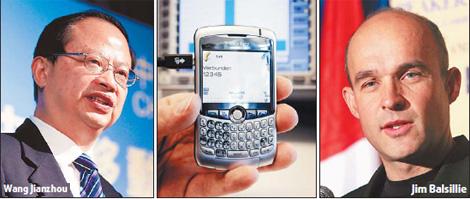
Canadian smartphone maker Research In Motion (RIM) said yesterday it would launch a customized version of the BlackBerry that supports China's home-grown 3G standard, as part of its latest efforts to expand in the world's largest mobile phone population.
The world's second largest smartphone vendor signed an agreement with China Mobile to deliver a BlackBerry model that supports China Mobile's TD-SCDMA network.
The new handset, which would start shipping "soon", will be targeted at Chinese small companies and individual consumers, according to RIM.
"We view China as a strategic market. And China Mobile is by far the largest mobile carrier in the world," said Jim Balsillie, the company's co-chief executive.
Balsillie said the new BlackBerry handset would support China Mobile's wireless services such as the China Mobile's App Store and the instant messaging service Fetion. RIM is also planning to bring its own App Store, "App World", to China next year, Balsillie said.
The partnership with China Mobile came shortly after RIM reached agreement on Monday with one of the country's largest IT products distributor, Digital China, to sell phones in China.
Previously, BlackBerries were only officially available in China for corporate users through China Mobile's sales channels. Balsillie said yesterday that the company plans to expand to tap individual consumers and small businesses.
The Chinese government issued the 3G license earlier this year to major Chinese telecom operators, attracting cellphone makers such as Apple Inc, RIM and Nokia.
China Unicom last month introduced the Apple iPhone in China, but its high price proved to be prohibitive. Some experts said this would provide an opportunity for companies such as RIM.
Wang Jianzhou, chairman of China Mobile, said yesterday that the company would release a cheaper package for the new BlackBerry model to attract individual consumers. He said China Mobile currently has more than 4 million 3G users and the number is expected to reach 5 million by the end of the year.
China Mobile is the only carrier to adopt the TD-SCDMA around the world, making it reliant on the support of major handset makers. The company announced earlier this year it would give 600 million yuan in subsidies to cellphone makers to develop TD-SCDMA handsets.
In 2006, RIM signed a partnership with China Mobile to launch BlackBerries for corporate clients, especially multinationals, in China. However, the deal has not been productive because China Mobile failed to introduce any new models over the following three years.
China Mobile current only provides one old BlackBerry model, with service packages ranging from 398 to 598 yuan per month.
Balsillie said yesterday that RIM was investing in manufacturing and research and development in China. He said the company procured $2 billion worth of goods in China for its global operations this year.
RIM and China Mobile also announced yesterday they would join hands in developing BlackBerry models that support TD-LTE, China's home grown fourth generation (4G) technology.





